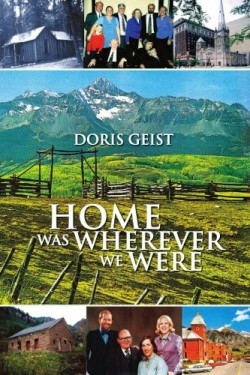Home Was Wherever We Were
This memoir follows the life of Doris Geist, a wife and mother, over the past nine decades. The author begins by describing her grandparents, German and Norwegian immigrants, and their efforts to assimilate and thrive in the western United States during the early years of the twentieth century. She continues with details about her husband’s family and his early upbringing on a farm in North Dakota, then goes on to describe her early life in Colorado and North Dakota, providing a picture of an innocent, ordinary childhood listening to the radio, visiting relatives, and the like. She recalls suffering from hearing loss, and struggling to cope with this. She began dating her husband Elton in high school in 1937, and they married soon after.
The bulk of the book provides a forthright chronicle of a sixty-three-year marriage, complete with disagreements and near divorce, subsequent to his affairs with other women. The couple raised two children while coping with World War II, Elton’s challenges as a mining engineer, and multiple moves around the country. Doris got a master’s degree and became an active committeewoman for numerous organizations and eventually a partner with Elton in a worldwide consulting firm. Their life had its tragedies: they lost their son to AIDS in 1994, and Elton struggled with Parkinson’s disease.
The author’s abilities include an impressive memory (and/or journal-keeping) and organizational skills. Unfortunately, she lacks the innate gift of storytelling that would give this chronicle wider appeal. While the prose is crisp, it never rises above the level of mundane reporting. Her husband’s affairs and her son’s long-term illness are described as matter-of-factly as her work with the League of Women Voters, or visits to see family and friends in Colorado. Her mother’s death, for instance, is described as follows:
This was a sad time for me, as it is for anyone whose mother dies. And having to have a tooth pulled almost immediately didn’t help, especially when I developed a dry socket and was really uncomfortable…I felt sad and listless for several months.“
Anecdotes, in general, would have benefited from less exacting detail, and more emotional depth or writerly description. The couple did an amazing amount of traveling around the world, but again, it is not effectively described. One trip account concludes: “Actually I didn’t like Japan much. This probably stemmed mostly from WWII and was pretty irrational since the late autumn weather was lovely, the city beautiful, clean and safe…I suppose my major objection was the food, most of which I found inedible.”
This effort is clearly meant for the author’s family and represents a commendable achievement in this sense. It is easy to applaud the hard labor and honesty required of her. Fashioning a more generally interesting work for the public, however, would require additional skill.
Disclosure: This article is not an endorsement, but a review. The publisher of this book provided free copies of the book and paid a small fee to have their book reviewed by a professional reviewer. Foreword Reviews and Clarion Reviews make no guarantee that the publisher will receive a positive review. Foreword Magazine, Inc. is disclosing this in accordance with the Federal Trade Commission’s 16 CFR, Part 255.

